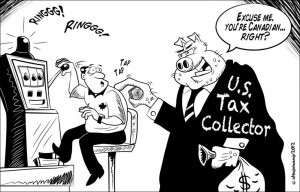Gambling Winnings Tax Rate
- Taxes On Casino Winnings Calculator
- Gambling Winnings Tax Rate 2018
- Gambling Winnings Tax Rate
- Taxes On Winnings Calculator
- Federal Gambling Winnings Tax Rate
- The news about taxes on gambling winnings doesn’t end there. The gambling institution is required to withhold 24% of your winnings as federal withholding tax, down from the previous 25% under the tax reform law. At tax time, you’ll receive Form W-2G for all reported winnings showing the amount you won and the taxes withheld.
- “Taxpayers can deduct gambling losses only up to the amount of their gambling winnings,” says Leddy, “and only if they itemize their deductions.” For example, if your gambling winnings totaled $5,000 in the tax year, but you lost $6,000, you can only deduct $5,000 of those losses.
In the United States, the tax rate owed on gambling winnings is a flat 25%. If you win big in Las Vegas at poker, the casino must withhold the 25% when collect your cashout, and provides you with IRS form W2-G to report your winnings to the government. Find out more on the IRS website. What is the tax rate for lottery winnings? For federal taxes, lottery winnings are taxed according to the federal tax brackets. Federal tax brackets are progressive, so portions of the winnings are taxed at different rates, and could be as high as 37%. State income taxes vary by location. Some states do not have a state income tax, while others. The rate is determined by the amount of the payout. If a prize is taxable (i.e., over $10,000), the entire amount of the payout is subject to withholding, not just the amount in excess of $10,000. The withholding rates for gambling winnings paid by the New Jersey Lottery are as follows: 5% for Lottery payouts between $10,001 and $500,000.
Gambling Winnings Subject to Tax?

With all sports betting, casino, poker, daily fantasy, and state lotteries, is the government entitled to a fair share? The most accurate answer is, you can bet on it. While that fair share might cause you to grumble under your breath, the fact is gambling winnings are taxed.
Now, you might wonder if you can use your losses at the table or on the ballgame as a write-off. Here is a detailed guide that addresses all your questions about taxes on gambling. We’ll discuss how winnings are taxed, some state and federal requirements, plus which forms you need to use to report gambling income.
How Are Gambling Winnings Taxed
Answering the question about how gambling winnings are taxed involves looking at different situations. Of course, the guidelines for the federal income tax process are standard across the country.

States have various tax structures, so you need to inquire about those for the state in which you file your state taxes. Here is an overview of both federal and state guidelines for how gambling winnings are taxed.
The first thing to know is the difference in how you generated your winnings. If you win over $600 at the horse track, $1,200 on a slot machine or in a bingo game, $1,500at keno, or $5,000 or more at a poker table, you must report these winning to Uncle Sam.
For this reason, most tracks and casinos require your Social Security number before you’re paid out on any big cash win. You also must complete an IRS Form W2-G, and report the amount you won on this form.
You might immediately think this is all overkill because, in most instances, a casino is going to deduct 25% before they pay out your winnings. You’ll get a receipt, of course, since these monies will be earmarked for the US Government Treasury.
Now, what if you win an amount of money gambling that is less than those previously listed? According to the IRS, you are legally obligated to report these winnings as income on your federal taxes.
To be on the safe side, always report the money you win gambling, whether it’s on a horse, a puppy, a spill out from a slot machine, or big pot when you’re holding a royal flush. Gambling income is taxed federally.
Many states with an income tax will also require you to report winnings, especially those where casinos and sportsbooks are becoming legal. Of special note, the only state for years where casino gambling was legal, Nevada, did not tax gambling income. Check with your state to determine whether you need to report your winnings.
There are often questions about how any money you win gambling online can be taxed. Online gambling taxes do have a few gray areas. Many of the current gambling venues are striving to offer online sportsbooks, so this type of gambling and how taxes apply is important.
What the IRS does is specify what is taxable and what is non-taxable income. In the world of daily fantasy sports, there are players who essentially earn their living by playing DFS contests. In these instances, you should take precautionary steps when it comes to taxes and your winnings.
Same concept will apply if you are in a state that eventually allows online sports betting through a sportsbook. IRS Publication 525 explains in detail what constitutes taxable and what is deemed non-taxable income.
Gambling Winnings will rarely fall under the category of non-taxable, so be prepared to treat online winnings from any type of gambling in the same manner you handle any money you win at a physical casino or sportsbook.
But, How Will They Know I Won?
One of the huge motivating factors behind states’ eagerness to legalize sports betting is the lucrative potential of such operations. Every state that allows casino gambling, or promotes a statewide lottery, has these same financial aspirations.
To risk that the IRS or state government won’t find out about your gambling profits is taking a gamble bigger than the risk you take to bet in the first place. Obviously, the state is going to know about every ticket that wins in their own lottery. Be confident that the federal government is going to get word of those winners as well.
When it comes to gambling, each state has some form of a gaming commission that oversees all operations. One of the stipulations to get a licensed casino is that all winners will be reported. To think that you might somehow circumvent this reporting process is naive.
If you do ignore gambling winnings when filing your taxes, you could be pursued for tax evasion. The consequences of being found guilty of tax evasion for failure to report gambling or lottery winnings is the same as if you attempted to evade paying taxes on any other earned income.
Report your winnings, because you won’t like the consequences of not reporting them. Casual gamblers can get by with a few receipts. One disadvantage of keeping limited records will befall you if you get lucky and win big.
Without strong receipts for previous losses, you will be unable to document these as deductions to offset the taxes leveled against your winnings. For anyone who takes pleasure in gambling frequently, keep your receipts and maintain at least a basic ledger of your gambling activity.
You don’t need to account for every nickel pumped into every slot machine, but documentation of total wins and losses will prove helpful when submitting your tax documents. Here are two of the basic IRS forms used to report winnings from gambling, including the standard personal income tax form.
• U.S. Individual Tax Return 1040
• IRS Form W-G2 Certain Gambling Winnings
Maintaining good records of your gambling activity will allow you to itemize your losses and deduct them from your final tax bill. However, you can also apply the same tax withholding structure for your gambling winnings that you apply to other types of income.
The income tax rate is 24% on all types of gambling profits, but there are certain sources of these winnings that are automatically subject to withholding tax. Follow the IRS guidelines to have a preset percentage taken out of your winnings.
This will not only help you avoid mistakes due to lapse in memory but can also eliminate being hit with a huge tax number at the end of the year. Here are some more frequently asked questions about gambling winnings and paying taxes on them.
Frequently Asked Questions About Gambling Winnings and Taxes
Here are some frequently asked questions in relation to gambling winnings and taxes.
1. Are you required to pay taxes if you win gambling at a physical casino?
The short answer is yes. A lengthier explanation simply involves the previous example discussed in how gambling winners are taxed. The law specifies that you must report all income from gambling games of all types.
While the guidelines on when that income becomes taxable are different for various games, the rules read that you must report all winnings. That will include any money you win at a physical casino, including an online sportsbook. Remember, you can always counter winnings by reporting losses as well. Keep your records organized.
2. Do you have to pay taxes on the money you win gambling online?
Again, the blunt answer is yes. Since the federal government, and many state governments for that matter, deem winnings from lotteries or gambling to be more than just good fortune. They are income that you generated by actively trying to obtain that money.
The IRS doesn’t care that you open up your handheld device to play a slot machine trying to dispense some extra change in your account. If the online slot machine produces a winner, they want their cut.
3. Do you owe taxes if you win playing daily fantasy sports games?
Not to sound redundant, but the answer again is yes. Be mindful, that to comply with federal law, daily fantasy sports providers are going to document your winnings. Any attempt to try to evade paying taxes on DFS winnings might land you in hot water with the IRS.
As with all other types of gambling, report your DFS winnings as well. DFS websites such as DraftKings and Fanduel will report winnings, especially big-ticket tournament winners. Again, federal law mandates reporting all income, including DFS prizes. Check with your state government for reporting requirements there.
4. Do you have to pay taxes on gambling winnings even if you’re not a resident of the United States?
While this question involves a little wider degree of supposition, the answer is still an emphatic yes. Even nonresidents who win at casinos or with a winning lottery ticket must pay a percentage to the federal government. Nonresidents who win at a casino must complete and submit IRS Form 1040NR.
5. Can gambling losses be written off on your tax return?
The first step is to report some amount of winnings from your gambling. This is why a ledger of your gambling activity can be useful. Once you acknowledge your winnings, you can itemize deductions for all your losses as well.
6. Do you still owe taxes if you leave all your deposits and winnings in your account?
Just because you do not make any withdrawals during a tax year, that does not negate the fact that you won. If you won money gambling during the tax year, it is a wise decision to record these winnings, and then report them according to the guidelines mentioned.
7. Are team or group gambling bets still taxed?
The same tax system that is applied to individual winnings earned from gambling, applies to any money you may win as part of a betting team. If you bet using the team concept, it is recommended you keep detailed records. The consequence is to be hit with a tax for the entire cash payout when you actually only received a percentage.
8. When you’re retired, do you still need to report winnings from gambling?
A large percentage of the casino gambling community is retired persons. You may think that since you’re retired, or on some form of fixed income, that you may not need to pay taxes on any money you win.
In all honesty, you can even be hit with a tax for winning a big bingo jackpot. If you’re retired, reporting gambling winnings can be even more important. By not reporting your gambling winnings, you can create a number of headaches for yourself.
You can be bumped into a different tax bracket, or have your medical coverage and premiums changed because of unreported income from winning at the poker table. Be dutiful with your gambling activity, especially if you’re enjoying your retirement years.
These are the basic principles of how gambling winnings are taxed. The most important principle to follow is to always report your winnings. When the alternative is to get hit with a surprise tax bill, honest consistency is the best policy.
Maintaining good records is also a worthy suggestion. Receipts can be used to itemize and deduct losses, plus you’ll know in advance how much tax you will owe on any winnings. While it might seem frivolous to keep records if you only gamble occasionally, there is always that possibility you hit a big cash jackpot.

Taxes On Casino Winnings Calculator
Free Betting News & Bonus OffersFind Out When You Can Legally Bet in Your StateLottery and Gambling Winnings
Winning the Lottery or scoring on a sports wager can change your life in profound ways. Congratulations on your lucky break!
Just remember that your good fortune includes a responsibility to pay taxes and fees on those winnings.
Gambling Winnings:
In 2018, Governor Phil Murphy signed a law that authorized legal sports betting in New Jersey. The law (A4111) allows people, age 21 and over, to place sports bets over the internet or in person at New Jersey's casinos, racetracks, and former racetracks. Sports betting is now among the many forms of gambling winnings that are subject to the New Jersey Gross Income Tax, including legalized gambling (sports betting, casino, racetrack, etc.) and illegal gambling.
Lottery:
New Jersey Lottery winnings from prize amounts exceeding $10,000 became subject to the Gross Income Tax in January 2009.
New Jersey Income Tax is withheld at an amount equal to three percent (3%) of the payout for both New Jersey residents and nonresidents (
Gambling Winnings Tax Rate 2018
N.J.S.A. 54A:5.1(g)).Gambling Winnings Tax Rate
Withholding Rate from Lottery Winnings
The rate is determined by the amount of the payout. If a prize is taxable (i.e., over $10,000), the entire amount of the payout is subject to withholding, not just the amount in excess of $10,000. The withholding rates for gambling winnings paid by the New Jersey Lottery are as follows:
- 5% for Lottery payouts between $10,001 and $500,000;
- 8% for Lottery payouts over $500,000; and
- 8% for Lottery payouts over $10,000, if the claimant does not provide a valid Taxpayer Identification Number.
Companies that obtain the right to Lottery payments from the winner and receive Lottery payments are also subject to New Jersey withholdings. Each company is required to file for a refund of the tax withheld, if applicable.
LotteryNew Jersey Lottery winnings from prize amounts exceeding $10,000 are taxable. The individual prize amount is the determining factor of taxability, not the total amount of Lottery winnings during the year.
- For example, if a person won the New Jersey Lottery twice in the same year, and the winning prize amounts were $5,000 and $6,000, these winnings would not be subject to New Jersey Gross Income Tax. However, if that person won the Lottery once and received a prize of $11,000, the winnings would be taxable.
- This standard for taxability applies to both residents and nonresidents.
- The New Jersey Lottery permits donating, splitting, and assigning Lottery proceeds to someone else or to a charity. If you choose to donate, split, or assign your Lottery winnings, in whole or in part, the value is taxable to the recipient in the same way as it is for federal income tax purposes.
Taxes On Winnings Calculator
Gambling and LotteryMaking Estimated Payments
If you will not have enough withholdings to cover your New Jersey Income Tax liability, you must make estimated payments to avoid interest and penalties. For more information on estimated payments, see GIT-8, Estimating Income Taxes.

Out-of-State Sales:
Out-of-state lottery winnings are taxable for New Jersey Gross Income Tax purposes regardless of the amount.
Gambling winnings from a New Jersey location are taxable to nonresidents. Gambling includes the activities of sports betting and placing bets at casinos and racetracks.
Federal Gambling Winnings Tax Rate
Calculating Taxable Income
You may use your gambling losses to offset gambling winnings from the same year as long as they do not exceed your total winnings. If your losses were greater than your winnings, you cannot report the negative figure on your New Jersey tax return. You must claim zero income for net gambling winnings. For more information, see TB-20(R), Gambling Winnings or Losses.
You may be required to substantiate gambling losses used to offset winnings reported on your New Jersey tax return. Evidence of losses can include your losing tickets, a daily log or journal of wins and losses, canceled checks, notes, etc. You are not required to provide a detailed rider of gambling winnings and losses with your New Jersey tax return. However, if you report gambling winnings (net of losses) on your New Jersey return, you must attach a supporting statement indicating your total winnings and losses.

Reporting Taxable Winnings
Include taxable New Jersey Lottery and gambling winnings in the category of “net gambling winnings” on your New Jersey Gross Income Tax return.